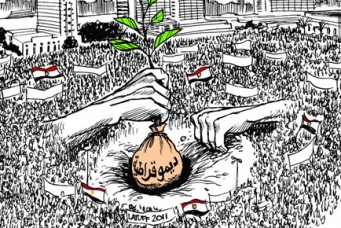The Guerilla Cartoonist of Rio
Carlos Latuff has penned some of the most acerbic political cartoons of the Egyptian revolution. One of them shows a shoe hurtling toward Hosni Mubarak, such use of footwear being one of the gravest personal insults in Arab culture. Another iconic image portrays Egypt’s longtime ruler as a diminutive figure, dangled from his collar by Khalid Said, the young Egyptian whose death in police custody fueled the January 25 uprising. Latuff’s cartoons are ubiquitous in Egypt, adorning everything from blog sites and Tahrir Square t-shirts to the front pages of Cairo dailies. Yet, the cartoonist is not an Egyptian, but slings his ink-tipped arrows from a studio in far away Brazil, his native country.
Carlos Latuff has penned some of the most acerbic political cartoons of the Egyptian revolution. One of them shows a shoe hurtling toward Hosni Mubarak, such use of footwear being one of the gravest personal insults in Arab culture. Another iconic image portrays Egypt’s longtime ruler as a diminutive figure, dangled from his collar by Khalid Said, the young Egyptian whose death in police custody fueled the January 25 uprising. Latuff’s cartoons are ubiquitous in Egypt, adorning everything from blog sites and Tahrir Square t-shirts to the front pages of Cairo dailies. Yet, the cartoonist is not an Egyptian, but slings his ink-tipped arrows from a studio in far away Brazil, his native country.
The Latuff phenomenon illustrates the unexpected ways that social media is being harnessed for political change in the Internet Age. Latuff, a freelance cartoonist in Rio de Janeiro, closely follows Egyptians on Twitter and Facebook to gain knowing insights for his cartoons. Egyptians, in turn, flood the Internet with the resulting drawings to amplify their revolutionary messages. Arab admirers have launched more than ten Facebook pages to promote Latuff’s cartoons, with some boasting thousands of fans. “We don’t feel like he’s foreign, because he knows all of the Egyptian jokes,” says Samar Sultan, a sophomore at the American University in Cairo. Latuff has won loyalists by continuing to produce his political commentaries long after the fall of the Mubarak regime. One of his most popular has Field Marshal Mohamed Hussein Tantawi taking a club to a television camera-–symbolizing the ongoing crackdowns on the news media. Another, which made the front page of theAl-Masry Al-Youm newspaper, celebrated “The Amazing Flagman”–a young Egyptian, depicted by Latuff in a Spiderman-type suit–who scaled the Israeli embassy in Cairo and took down its flag.
Latuff, 43, who has family roots in Lebanon and veers to leftist political views, launched his work as a self-styled “artivist” in the mid-1990s by faxing cartoons in support of Mexico’s Zapatista Army of National Liberation. When he first gained access to the Internet, he saw it as “theater for virtual guerrilla tactics.” In Brazil, his cartoons have raged against political brutality and homelessness. He first gained a reputation in the Middle East for cartoons sharply critical of Israel and in support of Palestinians. In a Cairo-to-Rio Skype call, Latuff explained his solidarity with the Arab Spring. “Sometimes I feel as if I am only giving their ideas a visual approach by converting their opinions into cartoons,” he said. “As a human rights activist, I seek to give a voice to the voiceless.”




